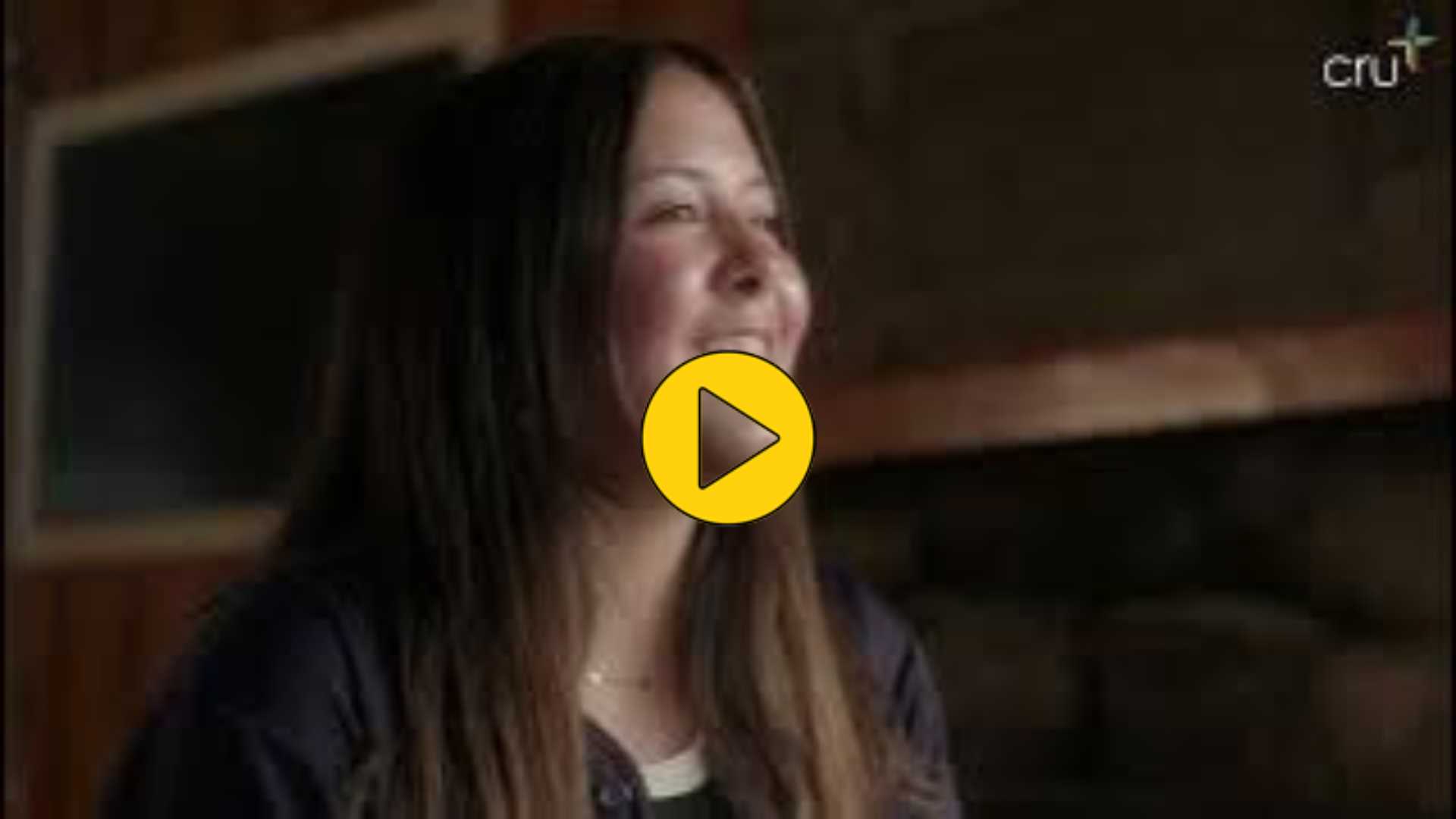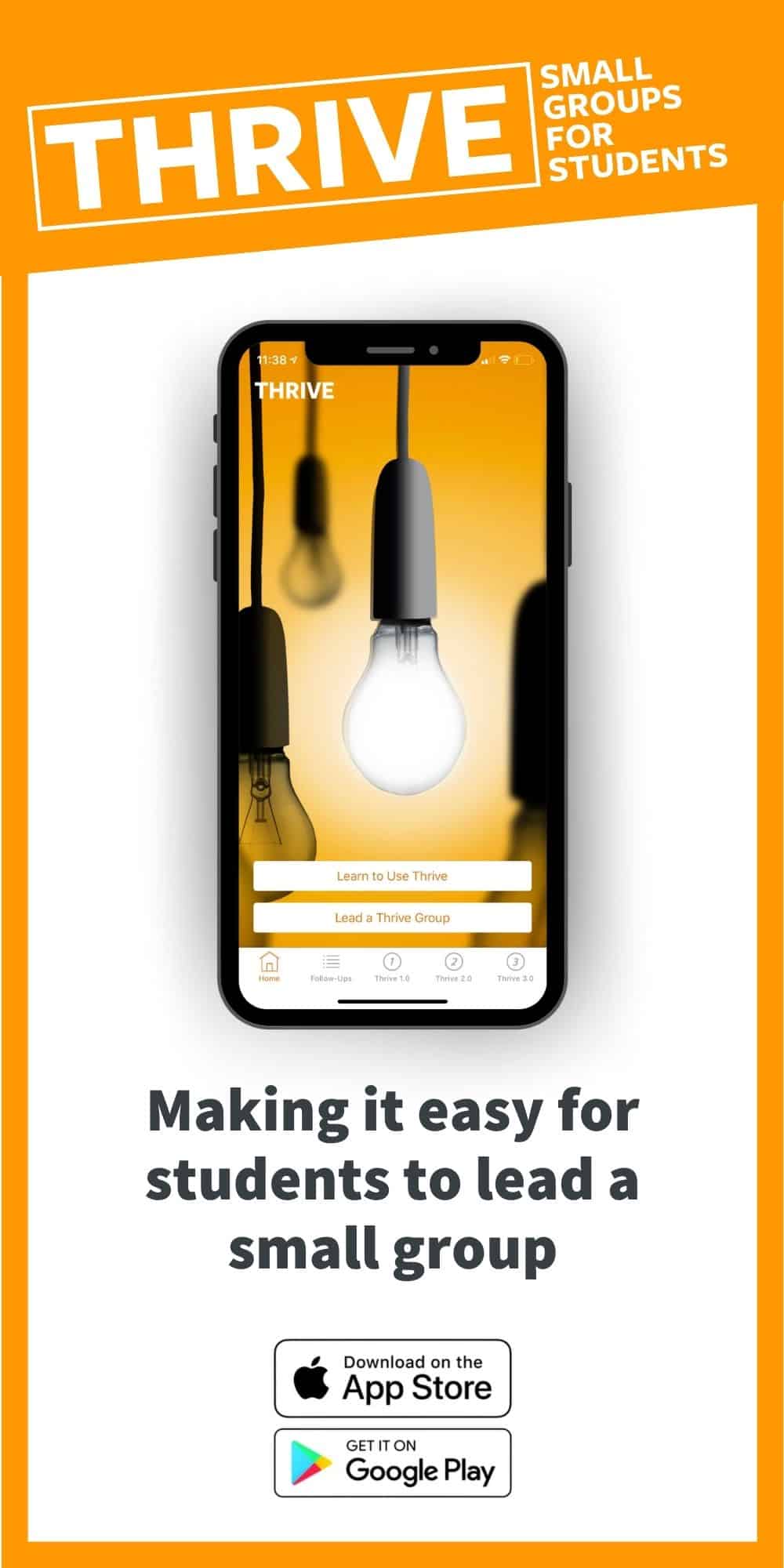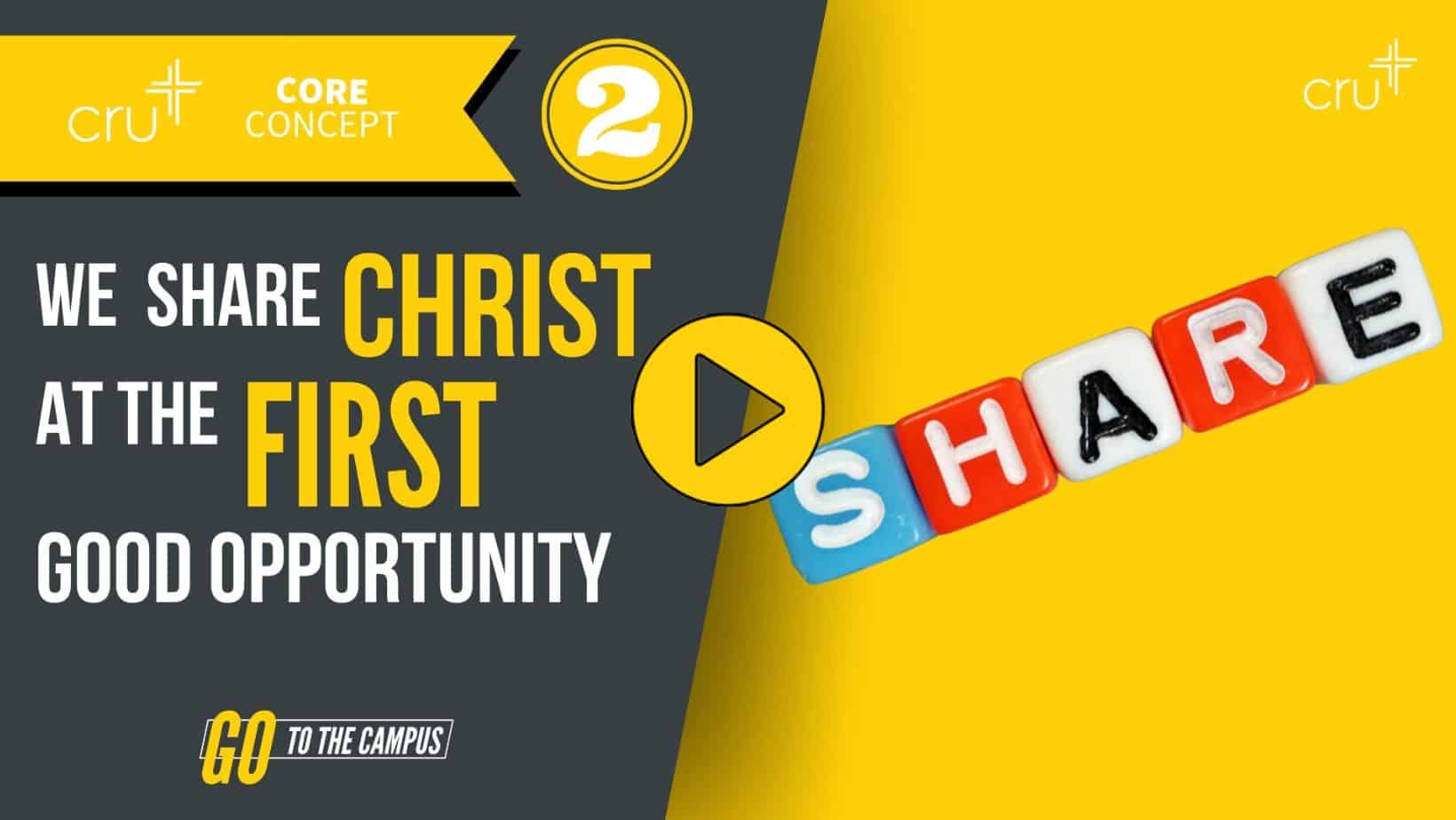The good news of Jesus connects to all parts of our lives. Therefore, there is potential within any conversation to turn it to Christ. If this is true, why do we find it so hard to bring up Jesus in our everyday interactions with the people around us, even with the students to whom we are ministering? How do we begin to cultivate habits of obedience in telling people about Jesus and hearing their beliefs?
Getting in Position
So you find yourself in a conversation with someone who is not yet a believer. Good job getting that far! Starting this connection is half the battle.
Now that you are conversing with another human being, you want to direct the conversation toward Jesus and His gospel. In this Go to the Campus video, Kevin and Mark share that there is a touchpoint for the gospel in every conversation and that the gospel should be shared at the first good opportunity.
Every conversation can pivot to spiritual truth if we are creative, prayerful, and Spirit-led. Within the conversation, focus on discovering the felt needs of the person, and when you see that opportunity, do not hesitate or talk yourself out of it.
During a Casual Conversation
There will be many opportunities to share Jesus with students simply by having a conversation with them. As you talk to them, prayerfully look for some common ground or a need in their lives where you could bring up the importance of having a relationship with God.
I met Jaylen at a coffee shop. He and a few of his friends came to hear about what Cru offered at his school and I’m pretty sure he came just because he was interested in one of the girls. As I walked away, I prayed for Jaylen.
Over the next few weeks, I saw him a few more times at coffee shops and got his phone number. I said, “Hey, Jaylen, you know I work with Cru. Would you be interested in meeting with me for coffee and hearing what Cru is all about?” He agreed and we met.
As we sat in a coffee shop, I asked him about his spiritual background. He mentioned that he went to church as a child, but stopped after his parents split up. I asked if he had ever read the Bible and heard about what Jesus offers to us. He said that he had never owned a Bible, and that he had heard about Jesus but couldn’t explain what He means to us.
I shared a Cru tool called Made To Thrive with him, and we read through Isaiah 53 in the Bible that I gave him. He indicated that he wanted to follow Jesus, but he still had a lot of questions. Because we have approached the subject once, we are able to easily revisit who Jesus is in our next conversation.
Once you identify where a person is experiencing the God-sized hole in their life, you can share how Jesus has helped you in that specific area.
After an Outreach Event
There are maybe two or three times a year that you can host a guest speaker to come to your school, or take a group of students to a Christian concert. This is prime time to dig into what the students are thinking about the message.
Whether the speaker shares the gospel or not, you can ask questions to gain some understanding of what the person is thinking about God and a relationship with Him.
Four questions:
- What did you think of the message/concert?
- Are there any questions you have about the event or message?
- How do you think we can know God in a personal way?
- Would you like to hear how you can begin a relationship with Him?
Obviously, there are other questions you can ask in between each of these questions to help bring more clarity. Check out our helpful tool called Navigating the Four Conversational Sound Barriers for more great question ideas. Memorize these questions so you have them “in your back pocket” to use easily.
If the student is interested, use a tool like Knowing God Personally or your personal three-minute testimony to share the gospel with the student.
After a Shooting, Loss, or Trial
In our broken world, tragedies, shootings, and natural disasters happen far too often. These are times when many people are seeking answers and justice. We believe that God offers both.
Take a risk and ask the student their thoughts on the tragedy and how they think God views what happened and how people are responding. Ask if they know about God’s perfect love and justice displayed through the life, death, and resurrection of Jesus.
Gen-Z’ers want to discuss what’s going on in our world and they have thoughts about how to fix it; but they likely don’t know how much the gospel of Jesus has to say about justice and restoration.
Using Evangelism Tools
Cru has many wonderful evangelism tools to help us in this process. While some, like Knowing God Personally or The Four Spiritual Laws, are focused on sharing the gospel in a brief manner, other tools are designed to simply begin a quality conversation that moves into spiritual territory.
Here are three tools that will be helpful as you begin Jesus conversations.
- Snapshot Cards: a perfect tool for artistic or creative students. It uses 52 dynamic images to help people visually explain their thoughts on God and life. BONUS: it comes in a playing card edition to make it even more conversational.
- QuEST Survey: a great way to initiate with anyone, or to start deeper conversations with someone you already know. It is five simple questions that start very shallow and fun, and progresses to more serious spiritual questions at the end.
- Perspective Cards: perfect for the deep thinker, this helps students put words to understand their worldview, and gives you an open opportunity to share yours.
- Exploration Questions: This is a great list of questions to help you transition a conversation toward Christ. Choose a few, memorize them, and try them out in your next conversaiton.
The gospel is the one antidote to a million different ailments, and Jesus is the great physician who came “to seek and to save the lost.”
Revisiting the Conversation
Once you have talked about Jesus one time, you can always begin a new spiritual conversation by saying, “remember that talk we had about Jesus?” Down the road, it is easier to resume the conversation once the ice is broken.
High school students are dynamic; they are always adapting, changing their minds about many things daily. Just because a student has no interest in following Jesus today does not mean they will never be interested. Be lovingly persistent—their eternity may be at stake!
Jesus Is Vital to All—Some Just Don’t Know It Yet
The gospel is the one antidote to a million different ailments, and Jesus is the great physician who came “to seek and to save the lost.” (Luke 19:10) Pastor Tim Keller said that “the gospel is not the ABCs of Christianity. It is the A-to-Z.”
It’s not something that you learn at the beginning of your walk with God, and then move on from. We each need the gospel daily. If we model daily dependence on God for all of our needs, people will be drawn to the beauty and freedom of this new life in Christ.
The Gospel provides:
- Healing for the Brokenhearted. “The Lord is close to the brokenhearted and saves those who are crushed in spirit.” (Psalm 34:18)
- Peace for the Anxious. “Peace I leave with you; my peace I give you. I do not give to you as the world gives. Do not let your hearts be troubled and do not be afraid.” (John 14:27)
- Security for the Insecure. “There is now no condemnation for those who are in Christ Jesus, because through Christ Jesus the law of the Spirit who gives life has set you free from the law of sin and death.” (Romans 8:1-2)
- Purpose and Meaning for the Academic.“For we are God’s handiwork, created in Christ Jesus to do good works, which God prepared in advance for us to do.” (Ephesians 2:10)
- Satisfaction for the Searching.“Then Jesus declared, “I am the bread of life. Whoever comes to me will never go hungry, and whoever believes in me will never be thirsty.” (John 6:35)
- Freedom for the Oppressed. “The Spirit of the Lord is on me, because He has anointed me to proclaim good news to the poor. He has sent me to proclaim freedom for the prisoners and recovery of sight for the blind, to set the oppressed free, to proclaim the year of the Lord’s favor.” (Luke 4:18-19)
Once you identify where a person is experiencing the God-sized hole in their life, you can share how Jesus has helped you in that specific area. “God did not send his Son into the world to condemn the world, but that the world should be saved through Him.” (John 3:17) God invites us into this saving work! Share “the hope that is in you, yet do it with gentleness and respect.” (1 Peter 3:15)
The next time you find yourself in a conversation with a student, remember that God is on your side, and that the gospel is relevant to every single person on earth.











